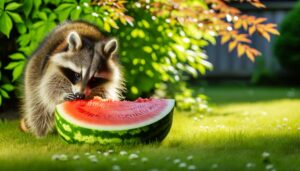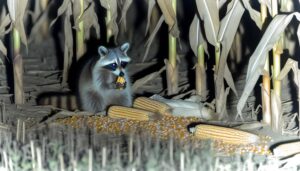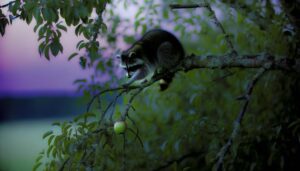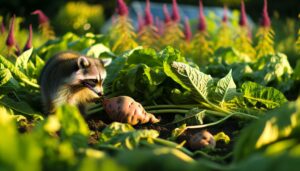How Raccoons Can Eat Human Food Safely
Raccoons can and do eat human food, frequently accessing leftovers, pet food, and processed items such as bread, pasta, and sugary snacks. This consumption often results in nutritional imbalances, obesity, dental problems, and exposure to harmful substances like chocolate and caffeine.
Behaviorally, raccoons in urban areas exhibit increased scavenging, reduced fear of humans, and altered nocturnal patterns. Ecologically, higher raccoon densities lead to altered predation, competition with other wildlife, and vegetation damage.
These shifts have significant implications on both raccoon health and urban ecosystems, suggesting further insights into their dietary habits and environmental impact await exploration.
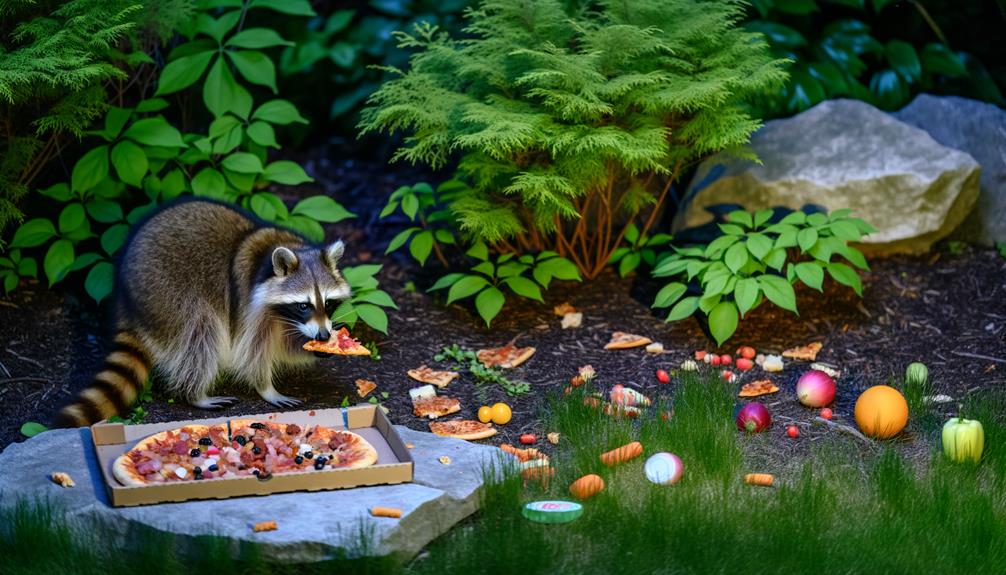
Key Takeaways
- Raccoons can eat human food, but it can lead to nutritional imbalances and health issues.
- Processed foods high in sugars, salts, and fats are particularly harmful to raccoons.
- Consuming human food can cause obesity and dental problems in raccoons.
- Raccoons may become dependent on human food, altering their natural foraging behavior.
- Increased scavenging for human food can result in more frequent and risky human-raccoon interactions.
Raccoons' Natural Diet
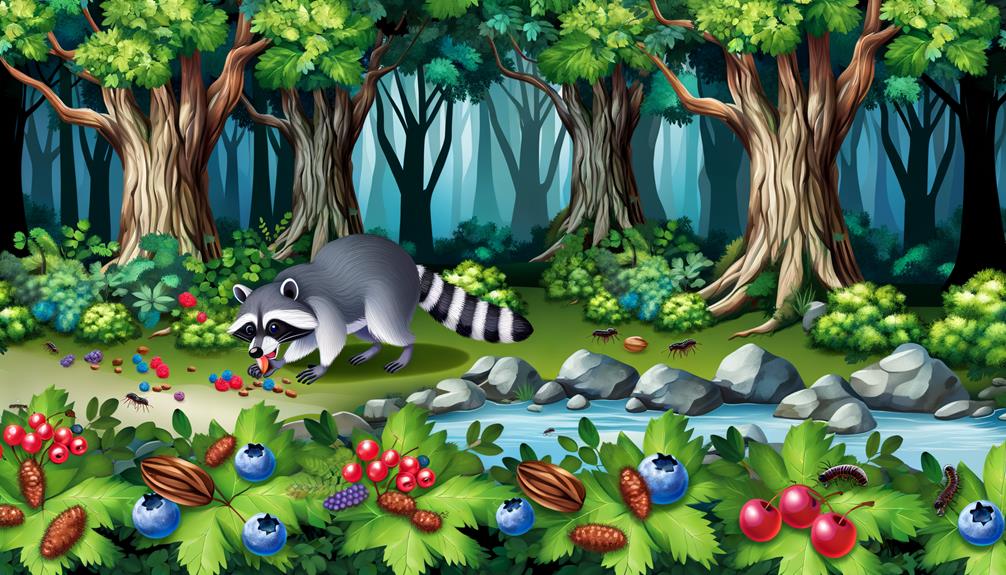
Raccoons' natural diet mainly consists of a variety of foods such as fruits, nuts, insects, small mammals, and aquatic organisms, reflecting their omnivorous feeding habits. This dietary flexibility allows raccoons to thrive in diverse environments, from urban areas to remote forests.
Their foraging behavior is primarily nocturnal, relying on their acute sense of touch and dexterous paws to locate and handle food. Seasonal variations also influence their diet; for instance, they consume more fruits and nuts during autumn to build fat reserves for winter.
In aquatic habitats, raccoons often hunt for crayfish, frogs, and other small aquatic creatures. This adaptability in diet underscores their ability to exploit different ecological niches, ensuring their survival and reproductive success.
Common Human Foods Consumed
In urban and suburban environments, raccoons frequently consume a variety of human foods, including leftovers, pet food, and garbage, which they encounter while scavenging. Commonly consumed items include processed foods such as bread, pasta, and cereals, as well as proteins like meat scraps, poultry, and fish.
Additionally, raccoons often eat fruits and vegetables discarded by humans, and they are particularly attracted to high-calorie, sugary foods like cakes, cookies, and other sweets. Pet food left outdoors is another significant food source, providing easy access to nutrition.
These dietary habits demonstrate raccoons' opportunistic feeding behaviors and their ability to adapt to human-modified environments, allowing them to thrive in close proximity to human populations.
Health Risks for Raccoons
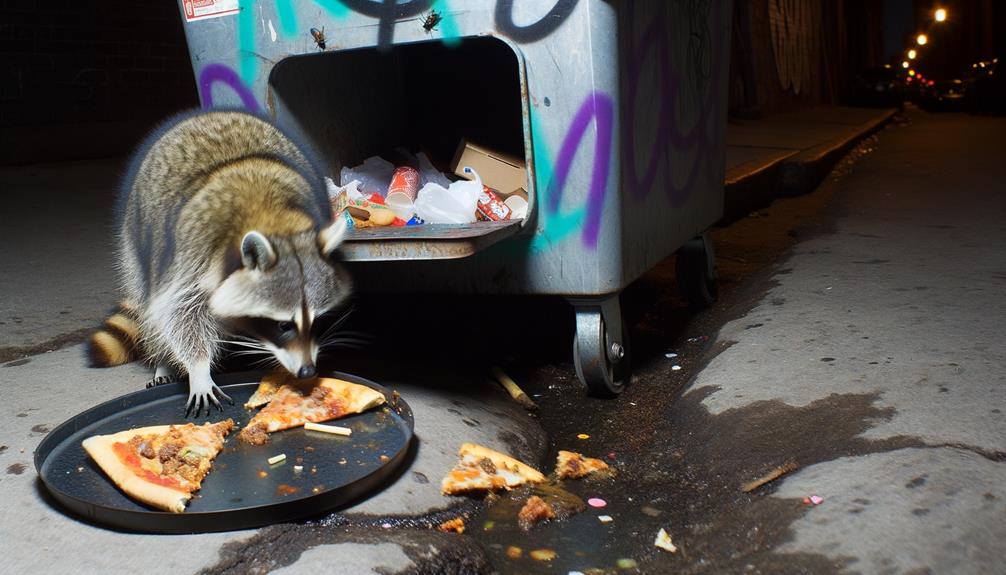
Consumption of human foods poses significant health risks to raccoons. This includes potentially leading to nutritional imbalances, obesity, and exposure to harmful substances. Human foods often lack the essential nutrients that raccoons require for prime health. Processed foods, in particular, contain high levels of sugars, salts, and fats, which can cause:
- Nutritional Deficiencies: Lack of essential vitamins and minerals.
- Obesity: Excessive caloric intake leading to overweight and related health issues.
- Dental Problems: Sugary foods contributing to tooth decay.
- Gastrointestinal Issues: Indigestion and potential blockages from inappropriate foods.
- Toxicity: Ingestion of harmful substances such as chocolate, caffeine, or xylitol.
Such dietary imbalances can compromise their immune system, making raccoons more vulnerable to diseases and reducing their overall lifespan.
Behavioral Changes
Exposure to human foods can lead to significant behavioral changes in raccoons, including increased scavenging in urban areas and altered foraging patterns. These changes often arise due to the high caloric density and easy accessibility of human food waste. Raccoons may become more nocturnal and display reduced fear of human presence. This shift can result in increased human-wildlife interactions and potential conflicts. Additionally, dependence on anthropogenic food sources may lead to decreased natural foraging skills.
| Behavioral Change | Description |
|---|---|
| Increased Scavenging | More frequent searches in urban trash bins. |
| Altered Foraging | Reliance on easily accessible human food waste. |
| Reduced Fear of Humans | More frequent and closer human interactions. |
These behavioral adaptations can have profound implications for raccoon populations.
Environmental Impact
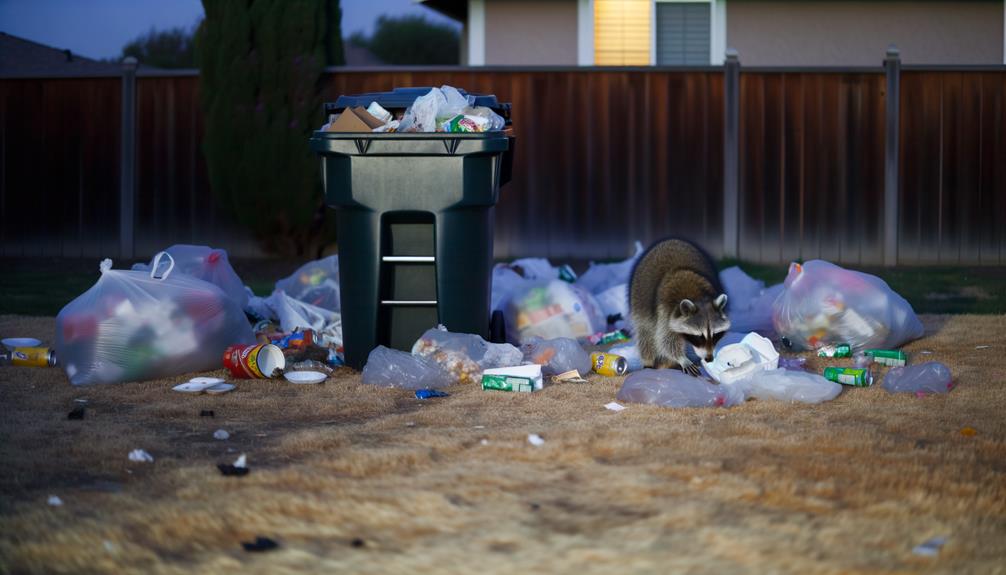
The widespread reliance of raccoons on human food sources can lead to significant alterations in local ecosystems, potentially disrupting native species and ecological balance. This shift can result in various environmental impacts:
- Altered Predation Patterns: Increased raccoon populations may prey more on native species, affecting their survival.
- Competition for Resources: Raccoons might outcompete other wildlife for food and habitat.
- Spread of Disease: Higher raccoon densities can facilitate the transmission of diseases to other wildlife and humans.
- Vegetation Damage: Foraging raccoons can harm plant life, leading to habitat degradation.
- Waste Accumulation: Reliance on human food often results in scattered refuse, impacting cleanliness and health of environments.
These changes underscore the need for managing human-raccoon interactions effectively.
Conclusion
To wrap up, while raccoons are adaptable omnivores capable of consuming a range of human foods, this dietary change can result in substantial health hazards, such as obesity and malnutrition.
Changes in behavior, like heightened aggression and reliance on urban settings, worsen these problems.
As a result, the environmental effect is significant, disturbing local ecosystems and biodiversity.
Therefore, it is crucial to discourage feeding raccoons human food to uphold ecological harmony and safeguard their welfare.

